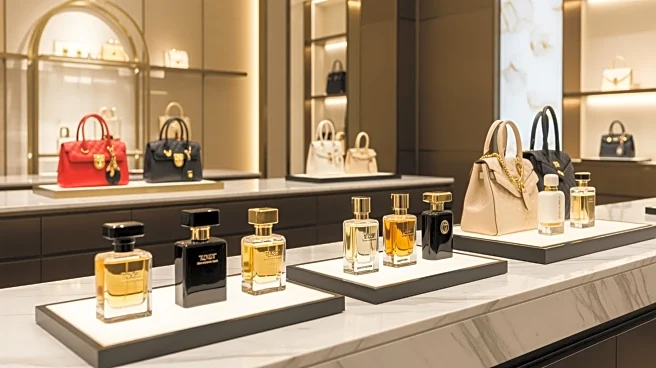What's Happening?
LVMH, the luxury conglomerate, is preparing to open several major stores in China, signaling a potential rebound in luxury demand within the world's second-largest economy. The company plans to open multistory stores for its brands Louis Vuitton, Dior,
Tiffany, and Loro Piana in Beijing this December. These stores are located in Taikoo Li Sanlitun, a high-end shopping area developed by Swire Properties Ltd. The expansion comes after a period of slow construction progress due to a slump in luxury sales. Additionally, LVMH is in discussions to open a new Christian Dior store in Shanghai, potentially by 2027, in collaboration with Swire and HKR International Ltd. This move is part of a broader strategy to capitalize on signs of recovery in China's luxury market, which has seen growth in the third quarter for LVMH and a smaller-than-expected sales decline for Gucci owner Kering SA.
Why It's Important?
The expansion of LVMH in China is significant as it reflects a cautious optimism about the recovery of the luxury market in one of its most critical regions. The opening of new stores could serve as a key indicator of market momentum, potentially boosting confidence among global retail leaders. This development is crucial for luxury brands that rely heavily on Chinese consumers, who have increasingly prioritized personal experiences and wellness over traditional luxury labels. The success of these new stores could influence other luxury brands to follow suit, potentially leading to increased investment and growth in the region. Furthermore, the collaboration with Swire Properties and the strategic location of these stores highlight the importance of integrating cultural and experiential elements into luxury retail spaces.
What's Next?
LVMH's expansion in China may lead to further collaborations with Swire Properties, including permanent and temporary spaces and major events. The success of the Louis Vuitton flagship store in Shanghai, which has already doubled retail sales in the third quarter, suggests that similar strategies could be employed in other locations. The expansion of Zhangyuan, a cultural and retail center in Shanghai, is expected to be completed by late 2026, potentially featuring more LVMH presences. As the luxury market in China continues to recover, other brands may also seek to invest in high-profile retail spaces, further driving growth and competition in the sector.
Beyond the Headlines
The expansion of LVMH in China underscores a shift in luxury retail strategy, focusing on large-scale design theatrics and cultural attractions to appeal to wealthy shoppers. This approach reflects broader trends in consumer behavior, where experiences and wellness are becoming more important than traditional luxury labels. The integration of exhibition spaces and cafes within luxury stores highlights the evolving nature of retail, where brands must innovate to maintain relevance and attract discerning customers. This shift could have long-term implications for the luxury industry, influencing how brands design their retail spaces and engage with consumers.
















